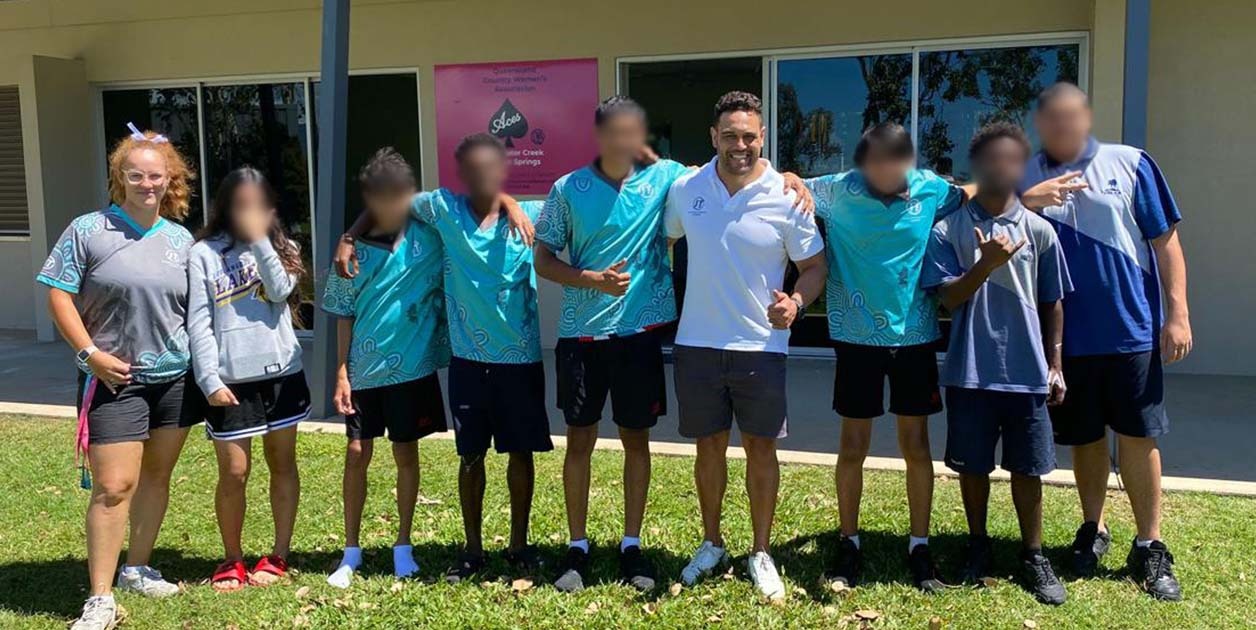
Safe Spaces, Stronger Voices: The Role of Emotional Support and Cultural Identity in Youth Development
For many young people in regional Queensland, the road to confidence, connection, and
emotional wellbeing is anything but smooth. Challenges such as disrupted family life,
generational trauma, disconnection from school, or negative peer pressure can silence even
the most promising voices. But when young people are offered a space where they feel heard,
respected, and seen for who they are—everything begins to change.
The Johnathan Thurston Academy’s JTYouGotThis (JTYGT) Program is that space.
Through culturally grounded practices, emotional guidance, and safe group sessions, the
program has empowered hundreds of young people to express themselves, connect with their
roots, and discover the strength in their stories.
Listening Without Judgment: The First Step to Change
A recurring theme across participant stories is the power of feeling heard. For many young
people entering the JTYGT program, shame, fear, and mistrust often lead to silence. Several
had previously been disengaged from school, the justice system, or support services. What
changed?
Trust
One young person, who had spent time couch surfing after conflict at home, described the
JTYGT program as the first place they felt comfortable speaking about their struggles.
Facilitators focused on building rapport before expectations—giving young people time to
open up at their own pace.
Another participant said, “Three things I learnt from the program: it’s okay to be nervous,
and you always feel better when you talk about your feelings.”
These breakthroughs aren’t accidental—they’re rooted in intention. Every session is designed
to create safety and affirmation.
Culture is Connection: Identity as a Pathway to Empowerment
JTA’s programs are more than just skill-building—they are deeply culturally inclusive.
Indigenous participants, in particular, benefit from activities that reconnect them with their
country, ancestors, and traditions.
From yarning circles to visits back on country, participants rediscover a part of themselves
that systems often overlook. In doing so, they develop pride in who they are—something
many never had the chance to explore in a structured environment.
One participant, previously disengaged and angry, began learning to manage emotions
through conversations about their identity and land. They said, “Now when I see a red flag,
instead of getting angry, I talk my way through it.”
This shift—recognizing, owning, and regulating emotion—is profound. And it’s made
possible when culture is treated not as a footnote, but a foundation.
Self-Belief and Courage: More Than Just Words
The JTYGT program teaches core values: Self-Belief. Confidence. Courage. These aren’t
just aspirational terms—they become lived experiences.
Take the story of a young person who, after being expelled from school for violence, joined
the program and went on to build trust with a team, develop pro-social skills, and secure an
opportunity with the Cowboys House hospitality program. From isolation to integration,
the transformation was built on emotional safety and belief.
Another young person, previously ashamed and disengaged, was invited to return to the next
cohort to show leadership and role modeling. These are not just results—they are reflections
of internal transformation.
And who could forget the young man who received a courage award in front of his family?
“This is the first thing my mum can put on the fridge for me,” he said proudly. That moment
isn’t about the certificate—it’s about worth, validation, and emotional healing.
The Power of Peer Support and Group Identity
While individual mentoring is key, many participants thrive because of the peer-based
format of the program. Quiet girls found their voices. Isolated young people began building
friendships. Participants who once avoided social interaction began to mentor others.
In Hervey Bay, teachers noted clear improvements in student engagement, peer relationships,
and classroom atmosphere. Positive attention replaced disruption. Students felt heard, valued,
and part of something greater than themselves.
20 girls in one cohort showed stronger understanding of respectful behaviour—both in the
classroom and online. Their improved emotional awareness reflected across digital spaces
too, highlighting how these shifts extended beyond the room.
The Emotional Impact on Staff and Community
JTYGT’s impact isn’t confined to the young people alone. Staff and facilitators often express
how deeply meaningful it is to witness these transformations. One facilitator, Bernie, was
even invited to a cultural rites of passage workshop due to his commitment and
leadership—proof that the emotional impact of this work is intergenerational.
Schools, caregivers, and community partners also notice the change. “Great program, great
staff, and great messaging,” said one head of year. “It was obvious students felt empowered
after the sessions.”
Empowerment is contagious. When one young person stands taller, others rise too.
Looking Ahead: Scaling Emotional Safety and Identity-Affirming Learning
While transportation challenges, staffing gaps, and family conflict sometimes hinder
participation, the strength of the JTYGT program lies in its adaptability and emotional
backbone. Whether it’s through flexible session design, deeper community collaboration, or
pairing participants with mentors who understand their cultural experience, the program is
future-ready.
Safe spaces lead to strong voices.
The more these environments are scaled—especially in under-resourced areas—the more
young people will gain the tools to process emotions, build resilience, and make better
choices.
When You Know Who You Are, You Know What You’re Capable Of
The JTYouGotThis Program shows us that emotional development and cultural identity aren’t
soft skills—they are survival tools. They are what turn silence into expression, disconnection
into belonging, and shame into pride.
When a young person learns that their voice matters, they begin to use it. When they discover
their heritage is powerful, they begin to lead. And when they realize they don’t have to face
life’s challenges alone, they begin to grow.
Because when emotional safety meets cultural strength, transformation isn’t just
possible—it’s inevitable.
At JTA, we’re not just creating programs. We’re helping young people write their own
story. And in every story we see one truth: you’ve got this.



